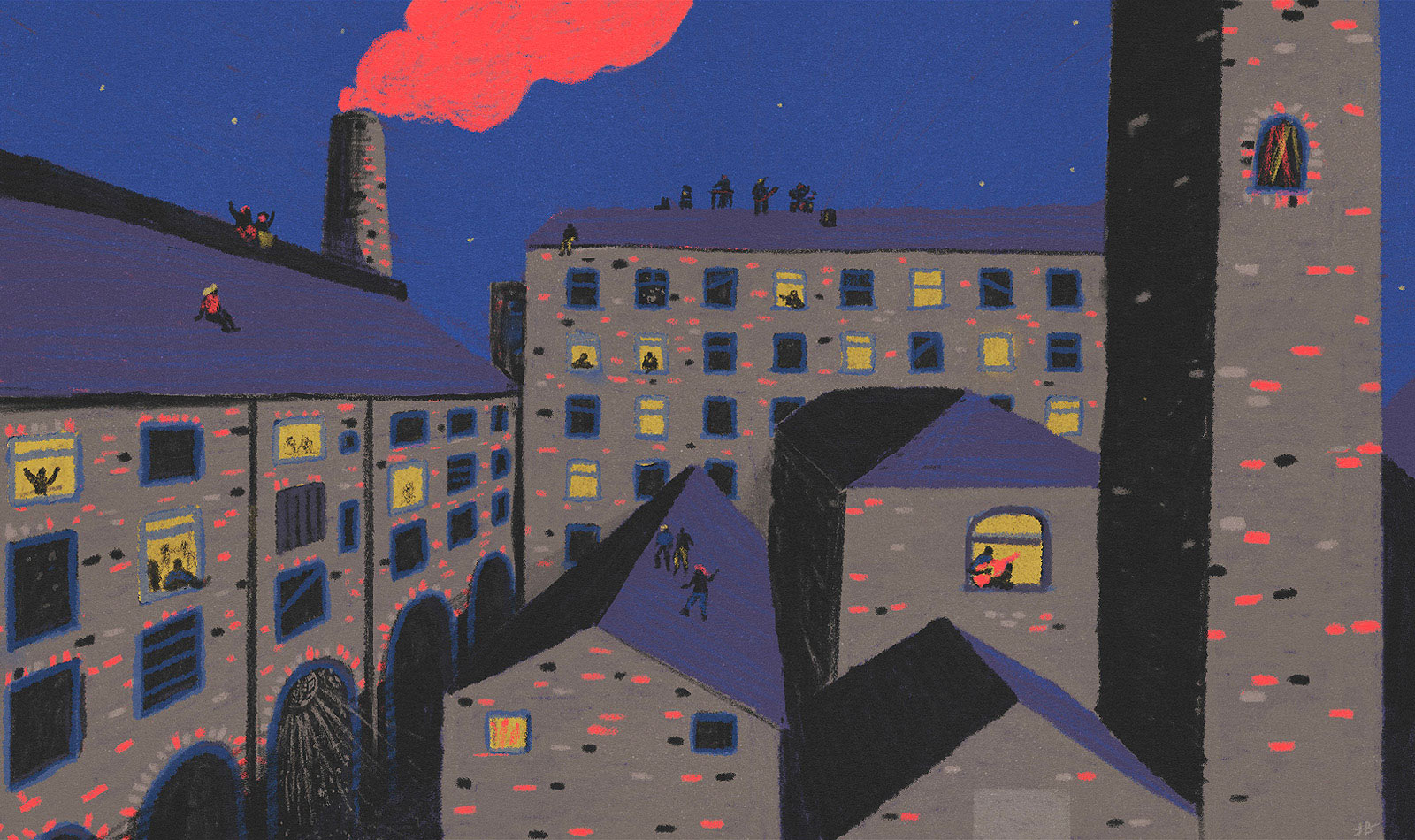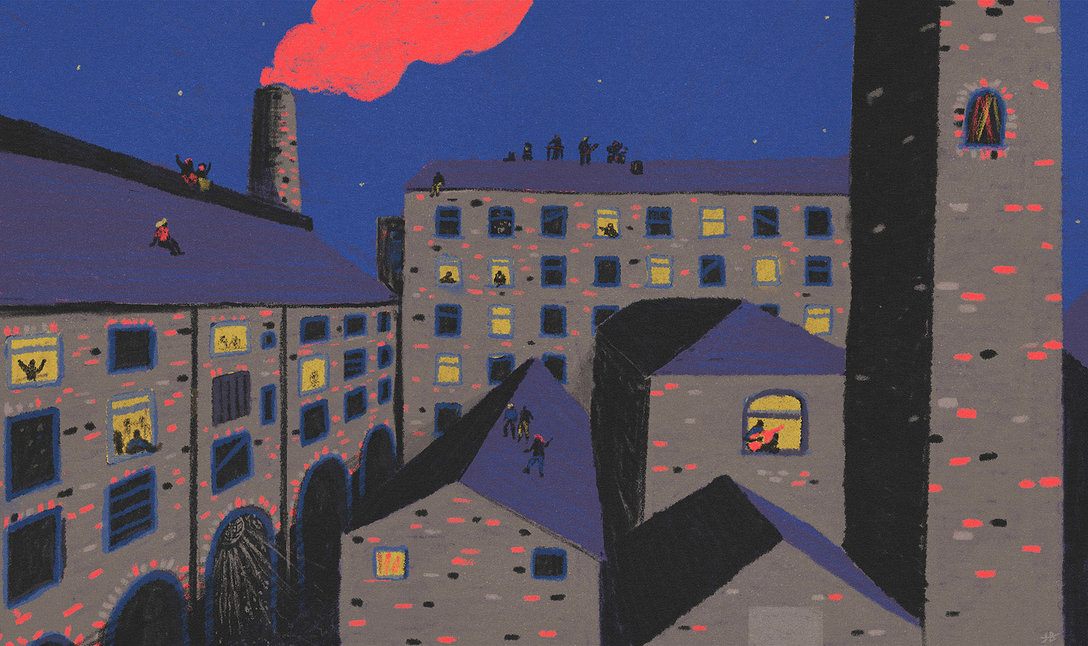Following Leeds: The Northern English City is Reshaping UK Indie
By
·
September 17, 2025

The northern English city of Leeds is good at reinventing itself. Once a flourishing hub for wool and textiles production during the Industrial Revolution, the city’s factories and mills, now repurposed as shops and residences, stand tall and proud amongst a plethora of small venues and music-loving pubs, and Europe’s largest outdoor market. A candidate for European Capital of Culture in 2023, after Brexit nullified the bid, the city went ahead with its own year-long cultural program called “LEEDS 2023” to showcase local musicians, artists, and performers. It’s with help from this community, which also includes bookers, promoters, and mentors, that Leeds’s rock scene is shaping the sound of British rock music right now.
Whilst you might identify musicians from nearby Manchester with more ease, Leeds has its own list of historical music exports. Consider ‘70s alt-rock icons like Mekons and Gang of Four and the bands who helped pioneer goth culture, like Sisters of Mercy and Soft Cell. There’s the likes of Kaiser Chiefs and Pigeon Detectives, who helped sculpt the sound of British indie in the ‘00s, and the work of Leeds Conservatoire alumni Corinne Bailey-Rae and Dan Smith of Bastille. Oh, and let’s not forget one of Leeds’s biggest contributions to pop music: Mel B from The Spice Girls. “For many years, Leeds has lived in the shadows of Manchester and Liverpool with their heavyweight musical heritages,” says GK of goth-grungers Venus GRRRLS. “This isn’t to say the music scene here hasn’t continued to thrive, it just feels as though people are finally waking up to it.”
Today, some of Leeds’s most promising artists come in the shape of guitar-wielding, electronica-loving, poetry-reading orators. “What appeals is the energy,” says Jack Simpson, co-owner of much-loved grassroots venue Hyde Park Book Club, audiophile bar Holding Patterns, and Eiger Studios, a recording studio and rehearsal space. “There’s something visceral going on that speaks to the tumultuous times we’re in. The mid-late 2010s was dominated by an incredible jazz scene, but it feels as though songs are back, and needed—as well as bands who want to write them.”
Musicians in Leeds enjoy both solid infrastructure and community support. Alongside Hyde Park Book Club, venues such as Wharf Chambers and Outlaws Yacht Club have given hundreds of bands some of their first gigs. “Brudenell Social Club is legendary,” says George Mitchell of electronic-leaning band HONESTY. “It’s a venue where upcoming bands can share a bill with icons, and it never feels like a mismatch. The North backs its own, but what’s exciting is how blurred the lines are becoming—rock, indie, and electronic are bleeding into each other. And Leeds is a place where you’re quite free to be hybrid.”
GK believes that a melding of music communities is what makes Leeds’s scene sound fresh. “With three of us being Leeds College of Music [now called Leeds Conservatoire] graduates, we were lucky to be in an environment where genres fused and interacted,” she says. “You’d see collaborations between metal musicians and funk musicians; you’d learn a lot from each other and be exposed to genres you wouldn’t usually reside in.” Greg Lonsdale, synth player and vocalist of Adult DVD, witnessed the evolution of the Leeds sound in real time: “Around six years ago, the Leeds music scene was very much populated with shoegaze and psych bands—our previous bands included,” he says. “It was great to play in bands like that, but seeing a static crowd with the odd head bob wasn’t cutting it for the live atmosphere we wanted to create.”
Grassroots initiatives are also making a difference. Come Play With Me is an organization that exists to support people from marginalized communities through events, a record label, an annual conference, and a publication, whilst Girls That Gig and Girl Gang are doing their bit to repair the historical gender imbalance in rock music; some mentees were no doubt inspired by the meteoric rise of English Teacher, fronted by vocalist, rhythm guitarist, and synth player Lily Fontaine. In September 2014, the band ended a 10-year run of the coveted Mercury Prize being won by London-based artists, underscoring just how influential both the band and the scene they emerged from have become across the UK.
The residents of Leeds—like most cities across the UK at the moment—are confronting a cost of living crisis, strained public resources, and youth club closures, making smaller venues like The Snug all the more crucial. “Having a 50-cap space really lowers the barrier of entry for bands wanting to share what they do,” explains Benny Howell, who books Hyde Park Book Club as well as Holding Patterns and Eiger Studios. “For the same price as hiring a rehearsal space, you can put on a show and play in front of a crowd. I think it’s given a lot of new faces in the scene the space to grow and figure out their sound.”
Considering the elements needed for any local music scene to grow, access to space is paramount—not only for rehearsing and performing, but as a place for people to connect. “You could book in for your first rehearsal at our studio site, Eiger, and end up bumping into English Teacher loading back into their room after headlining a festival”, says Howell. “I’m sure you could ask them anything about music or their journey, and they’d be happy to chat. That kind of openness is what I think makes Leeds great.”
Here are just a few crucial acts to help get you acquainted with the rock scene in Leeds.
English Teacher’s 2024’s release This Could Be Texas swung an overdue spotlight onto Leeds’s emerging rock scene, reaching #8 on the UK Official Albums Chart. The bandmembers—all of them songwriters—met at Leeds Conservatoire, where they wrote some of the tracks that featured on their debut album. They confront topics like racism, body image, and coming-of-age with witty lyricism set against off-beat jazz-rock breakdowns combined with elements of punk, folk, and electronica.
“Given Leeds had such an enriching goth scene over the last number of decades, it’s been a bit of a legacy we’ve always wanted to continue” says VENUS GRRRLS lead singer and guitarist GK. The five-piece are upholding that shadowy legacy in Leeds, whilst also evoking memories of Bikini Kill and Siouxsie and the Banshees. A young cancer survivor, GK draws from trauma, politics, and relationships in her lyricism, which is supported by cascading walls of guitar.
Electro-noise queerpunk outfit Bathing Suits released “Lousy Havoc” b/w “Relay” in February 2025 on cassette, a reminder that some music is best served lo-fi. Side A is mixed and mastered by DJ Subaru, a DJ known for their love of Italo disco, which tells you how wide-ranging Bathing Suits are in their approach. Catch them live and you’ll find vocalist and drum-machine menace Freyja Blevins writhing between the floor and the mic stand in, yes, a bathing suit.
The most electronic-leaning band on this list, HONESTY honor Leeds’s firm standing in club culture. The city is home to one of the longest-running club nights in the UK, Back To Basics, as well as the duo LFO, who helped to define UK bass music. HONESTY consist of four core members—George Mitchell, Matt Peel, Josh Lewis and Imi Marston—alongside a rotating cast of collaborators. Their 2025 album U R Here offers an industrial but accessible take on electronic music. “Leeds has always been a weird melting pot of different music,” says multi-instrumentalist Mitchell. “You’ve got sound clash culture, you’ve got Back to Basics house music, and then Sisters of Mercy, goth, and all the post-punk stuff that happened here. I guess we’re just a part of that.”
Six-piece Adult DVD have garnered a reputation for live shows that feel more like club nights. Sitting somewhere between indie, electronica, and acid house, their debut EP Next Day Shipping is a collection of spoken-sung tracks that are alternately moshable and danceable. “Our sound can be quite varied,” says synth player and vocalist Greg Lonsdale. “Some songs feel more punky, with driving bass lines and heavy drums, whereas some others may be more synth focused—keeping it more on the techno side of things.”
Cherry Fuzz Club describe themselves as more of a “loose committee” than a band. On the track “Ping-Pong,” they tell a story of unemployment, despairing the monotony of repetition and the struggles to find motivation: “Go to Tesco walk back, rinse and repeat/ Wish there were more aisles to walk down that I’d never seen/ 27’s the new 22/ I can’t go out if there’s nothing to do.”
In keeping with many Leeds bands before them, The 113’s (pronounced The One Thirteen) mostly monotone spoken-sung lyricism is one of the characteristics of their sound, which is in part inspired by bandleader Jack Grant’s love of hip-hop. Once the band have worked together to pin down the basics of each song, Grant records the band in his bedroom studio. Their 2025 EP To Combat Regret offers insight into their unabashedly noisy, mosh-friendly live sets.

